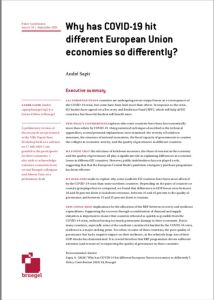Join getAbstract to access the summary!

Join getAbstract to access the summary!
André Sapir
Why has COVID-19 hit different European Union economies so differently?
Bruegel, 2020
What's inside?
European Union-wide disparities in COVID-19 economic losses hold important policy implications.
Recommendation
The coronavirus pandemic hit all members of the European Union hard, but some countries are faring worse economically than others. According to researcher André Sapir's incisive analysis, much of the disparity derives from three factors that vary broadly across EU countries: economic structure, institutional governance and shutdown rigor. This astute overview concludes that, to craft bespoke economic responses, EU leaders will have to parse carefully the drivers behind the slowdowns.
Summary
About the Author
André Sapir is a senior fellow with Bruegel.



















Comment on this summary